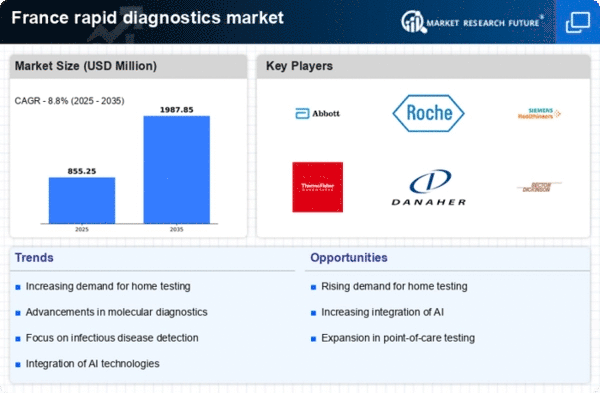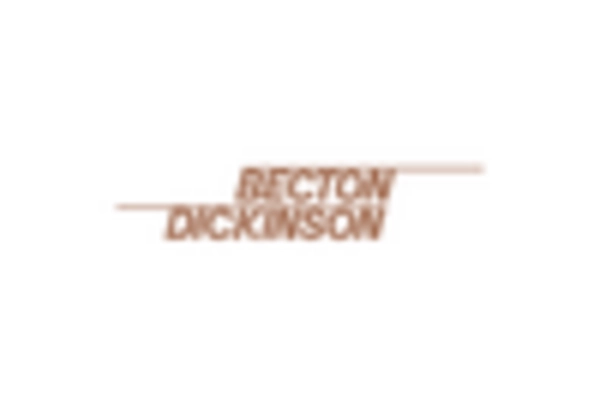Growing Prevalence of Chronic Diseases
The rising incidence of chronic diseases in France is a pivotal driver for the rapid diagnostics market. As the population ages, conditions such as diabetes, cardiovascular diseases, and respiratory disorders become more prevalent. This trend necessitates timely and accurate diagnostic solutions to manage these health issues effectively. According to recent health statistics, chronic diseases account for approximately 70% of all deaths in France, underscoring the urgent need for rapid diagnostic tools. The rapid diagnostics market is thus positioned to address this growing demand, providing healthcare professionals with the necessary tools to facilitate early detection and intervention, ultimately improving patient outcomes.
Technological Integration in Healthcare
The integration of advanced technologies such as artificial intelligence (AI) and machine learning into healthcare systems is reshaping the rapid diagnostics market. In France, healthcare providers are increasingly adopting these technologies to enhance diagnostic accuracy and efficiency. For instance, AI algorithms can analyze test results more rapidly than traditional methods, significantly reducing turnaround times. This technological evolution is projected to increase the market's growth rate by approximately 15% annually over the next five years. The rapid diagnostics market is likely to thrive as these innovations become more prevalent, enabling healthcare professionals to deliver faster and more precise diagnostic services.
Supportive Government Policies and Initiatives
The French government is actively promoting the adoption of rapid diagnostics through various policies and initiatives aimed at improving public health outcomes. Recent legislation has focused on streamlining the approval process for diagnostic tests, thereby facilitating quicker access to innovative solutions. Additionally, public health campaigns are encouraging the use of rapid testing in both clinical and home settings. This supportive regulatory environment is expected to bolster the rapid diagnostics market, as manufacturers and healthcare providers are incentivized to develop and implement new diagnostic technologies. The alignment of government objectives with market needs creates a conducive atmosphere for growth and innovation.
Increased Investment in Healthcare Infrastructure
France's commitment to enhancing its healthcare infrastructure significantly influences the rapid diagnostics market. The government has allocated substantial funding to modernize healthcare facilities and integrate advanced diagnostic technologies. This investment is expected to reach €10 billion by 2026, focusing on improving laboratory capabilities and expanding access to rapid testing solutions. The rapid diagnostics market stands to benefit from this influx of resources, as healthcare providers seek to adopt innovative diagnostic tools that can streamline patient care and reduce waiting times. Enhanced infrastructure not only supports the deployment of rapid diagnostics but also fosters collaboration between public and private sectors, driving further advancements in the field.
Rising Consumer Awareness and Health Consciousness
There is a notable increase in consumer awareness regarding health and wellness in France, which is propelling the rapid diagnostics market. As individuals become more proactive about their health, the demand for quick and reliable diagnostic tests is surging. Surveys indicate that over 60% of the French population is now inclined to utilize rapid testing solutions for various health conditions. This shift in consumer behavior is prompting healthcare providers to incorporate rapid diagnostics into their services, thereby enhancing the overall patient experience. The rapid diagnostics market is thus witnessing a transformation, as it adapts to meet the expectations of a more informed and health-conscious public.

















